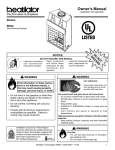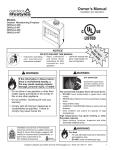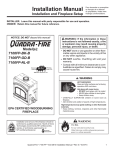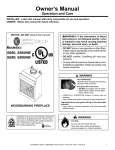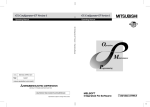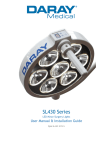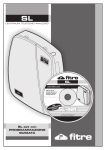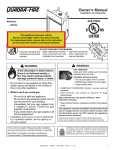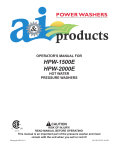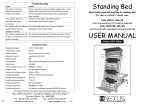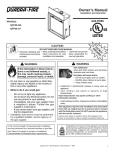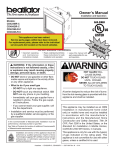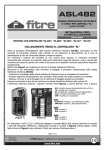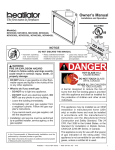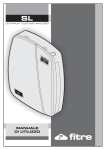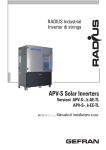Download Owner`s Manual
Transcript
Owner’s Manual Installation and Operation Models: Outdoor Woodburning Castlewood 42 DO NOT DISCARD THIS MANUAL • Important operating • Read, understand and follow these and maintenance instructions for safe instructions included. installation and operation. WARNING If the information in these instructions is not followed exactly, a fire may result causing property damage, personal injury, or death. • Do not store or use gasoline or other flammable vapors and liquids in the vicinity of this or any other appliance. • Do not overfire. Overfiring will void your warranty. • Comply with all minimum clearances to combustibles as specified. Failure to comply may cause house fire. WARNING: For Outdoor Use Only. Installation and service of this fireplace should be performed by qualified personnel. Hearth & Home Technologies suggests NFI certified or factory-trained professionals, or technicians supervised by an NFI certified professional. T O N RD O A D SC I D CAUTION • Leave this manual with party responsible for use and operation. WARNING HOT SURFACES! Glass and other surfaces are hot during operation and cool down. Hot glass will cause burns. • Do not touch glass until it is cooled • NEVER allow children to touch glass • Keep children away • CAREFULLY SUPERVISE children in same room as appliance. • A l e r t c h i l d r e n a n d a d u l t s t o h a z a r d s o f h i g h temperatures. High temperatures may ignite clothing or other flammable materials. • Keep clothing, furniture, draperies and other combustibles away. WARNING Fire Risk • For use with solid wood fuel or decorative gas appliance only. • Do not install unvented gas logs. Outdoor Lifestyles by Hearth & Home Technologies Inc. • 4070-300 Rev H • 11/20/14 1 Read this manual before installing or operating this fireplace. Please retain this owner’s manual for future reference. Congratulations! Congratulations on selecting a Outdoor Lifestyles wood burning fireplace. The Outdoor Lifestyles fireplace you have selected is designed to provide the utmost in safety, reliability and efficiency. As the owner of a new fireplace, you’ll want to read and carefully follow all of the instructions contained in this owner’s manual. Pay special attention to all cautions and warnings. The information contained in this owner’s manual unless noted otherwise, applies to all models and gas control systems. Your new Outdoor Lifestyles wood burning fireplace will give you years of durable use and trouble-free enjoyment. Welcome to the Outdoor Lifestyles family of fireplace products! This owner’s manual should be retained for future reference. We suggest you keep it with your other important documents and product manuals. Homeowner Reference Information We recommend that you record the following pertinent information about your fireplace: Model Name: Date purchased/installed: Serial Number: Location on fireplace: Dealership purchased from: Dealer phone: Notes: Listing Label Information/Location The model information regarding your specific fireplace can be found on the rating plate located on the smoke shield of the fireplace. Grate Serial Number FIREPLACE NO. WARNING: RISK OF FIRE DAMAGE. REPLACE GRATE WITH HEARTH & HOME TECHNOLOGIES INC. Fireplace Model MODEL NO. MODEL NO. MFG. DATE OUTDOOR FIREPLACE INTENDED FOR USE WITH HEARTH & HOME TECHNOLOGIES INC. LISTED FIREPLACE PARTS. SEE INSTALLATION AND OPERATING INSTRUCTIONS FOR THIS MODEL. ONLY HEARTH & HOME TECHNOLOGIES INC. GLASS DOOR KITS CAN BE INSTALLED ON THIS UNIT. FIREPLACE ALSO FOR USE IN MANUFACTURED HOMES YES FAN KIT MODEL NO. CLEARANCE TO COMBUSTIBLES: NO & DO NOT OVERFIRE. USE ONLY: SOLID WOOD FUEL OR LISTED DECORATIVE GAS APPLIANCE. DO NOT USE A FIREPLACE INSERT OR OTHER PRODUCTS NOT SPECIFIED FOR USE WITH THIS PRODUCT. IF DOORS ARE USED OPERATE FIREPLACE WITH DOORS FULLY OPEN OR CLOSED ONLY. WHEN BURNING A DECORATIVE GAS APPLIANCE IN THE FIREPLACE, ADJUST DAMPER TO THE FULLY OPEN POSITION. CHIMNEY 2 IN. MIN. IN. MIN. FIREBOX RATED AT 115 VOLTS, 50/60 Hz., AMP. WARNING! THIS FIREPLACE HAS NOT BEEN TESTED WITH AN UNVENTED GAS LOG SET. TO REDUCE THE RISK OF FIRE OR INJURY, DO NOT INSTALL AN UNVENTED GAS LOG SET INTO FIREPLACE. WARNING! TO AVOID THE RISK OF DAMAGING FIREPLACE MATERIALS AND INCREASING THE RISK OF SPREADING A FIRE DO NOT USE THE FIREPLACE TO COOK OR WARM FOOD. IF INSTALLATION OR OPERATING INSTRUCTIONS ARE MISSING CONTACT: HEARTH & HOME TECHNOLOGIES INC., 1915 W. SAUNDERS ST., MT. PLEASANT, IA 52641. 2 Outdoor Lifestyles by Hearth & Home Technologies Inc. • 4070-300 Rev H • 11/20/14 1 Listing and Code Approvals 2 Getting Started Table of Contents A. Appliance Certification. . . . . . . . . . . . . . . . . . . . . . . . . 4 A. Design and Installation Considerations. . . . . . . . . . . . 5 B. Non-Combustible Materials. . . . . . . . . . . . . . . . . . . . . 5 C. Combustible Materials . . . . . . . . . . . . . . . . . . . . . . . . . 5 D. Tools and Supplies Needed . . . . . . . . . . . . . . . . . . . . . 5 E. Inspect Fireplace and Components . . . . . . . . . . . . . . . 6 F. Grate. . . . . . . . . . . . . . . . . . . . . . . . . . . . . . . . . . . . . . . 6 G. Firescreen. . . . . . . . . . . . . . . . . . . . . . . . . . . . . . . . . . . 6 H. Cooling Air . . . . . . . . . . . . . . . . . . . . . . . . . . . . . . . . . . 6 I. Molded Brick Panel. . . . . . . . . . . . . . . . . . . . . . . . . . . . 6 3 Framing and Clearances 4 Installation of Fireplace 5 Chimney Assembly 6 Complete the Enclosure 7 Installation of Molded Brick Panel A. B. C. D. E. Selecting Fireplace Location. . . . . . . . . . . . . . . . . . . . 7 Clearances . . . . . . . . . . . . . . . . . . . . . . . . . . . . . . . . . 9 Sidewalls/Surrounds. . . . . . . . . . . . . . . . . . . . . . . . . 10 Frame the Fireplace . . . . . . . . . . . . . . . . . . . . . . . . . 10 Chimney Requirements. . . . . . . . . . . . . . . . . . . . . . . 11 11Troubleshooting A. Diagnostics and Problem Solving. . . . . . . . . . . . . . . . 31 12 Maintenance and Servicing the Fireplace A. B. C. D. E. Disposal of Ashes . . . . . . . . . . . . . . . . . . . . . . . . . . . 32 Chimney Inspection/Cleaning. . . . . . . . . . . . . . . . . . 32 Firebox Refractory. . . . . . . . . . . . . . . . . . . . . . . . . . . 32 Maintenance Task List. . . . . . . . . . . . . . . . . . . . . . . . 33 Chimney Fire. . . . . . . . . . . . . . . . . . . . . . . . . . . . . . . 33 13 Reference Materials A. Fireplace Dimensions. . . . . . . . . . . . . . . . . . . . . . . . . 34 B. Optional Components. . . . . . . . . . . . . . . . . . . . . . . . . 35 C. Chimney Components . . . . . . . . . . . . . . . . . . . . . . . . 36 D. Termination caps. . . . . . . . . . . . . . . . . . . . . . . . . . . . . 38 ► E. Service Parts List . . . . . . . . . . . . . . . . . . . . . . . . . . . . 39 F. Limited Warranty . . . . . . . . . . . . . . . . . . . . . . . . . . . . 41 G. Contact Information . . . . . . . . . . . . . . . . . . . . . . . . . . 43 A. Secure the Fireplace. . . . . . . . . . . . . . . . . . . . . . . . . 12 B. Install Cooling Air Hoods. . . . . . . . . . . . . . . . . . . . . . 13 A. Chimney Requirements . . . . . . . . . . . . . . . . . . . . . . . 14 B. Assemble the Chimney Sections . . . . . . . . . . . . . . . . 15 C. Using Offsets/Returns. . . . . . . . . . . . . . . . . . . . . . . . . 16 A. Chimney Termination . . . . . . . . . . . . . . . . . . . . . . . . . 17 B. Chase Top. . . . . . . . . . . . . . . . . . . . . . . . . . . . . . . . . . 17 C. Install the Termination Cap. . . . . . . . . . . . . . . . . . . . . 17 A. Install Hearth Molded Brick Panel. . . . . . . . . . . . . . . . 19 B. Install Back Molded Brick Panel. . . . . . . . . . . . . . . . . 19 C. Install Side Molded Brick Panel . . . . . . . . . . . . . . . . . 19 D. Install Screens . . . . . . . . . . . . . . . . . . . . . . . . . . . . . . 20 E. Mortar (Optional). . . . . . . . . . . . . . . . . . . . . . . . . . . . . 20 8Accessories A. Gas Log/Lighter Provisions. . . . . . . . . . . . . . . . . . . . 21 9Finishing A. Non-combustible Materials. . . . . . . . . . . . . . . . . . . . . 22 B. Combustible Materials . . . . . . . . . . . . . . . . . . . . . . . . 22 C. Hearth Extension . . . . . . . . . . . . . . . . . . . . . . . . . . . . 22 D. Raised Hearth Extension Framing. . . . . . . . . . . . . . . 23 E. Non-combustible Sealant. . . . . . . . . . . . . . . . . . . . . . 24 F. Finishing Material . . . . . . . . . . . . . . . . . . . . . . . . . . . . 25 G. Mantel . . . . . . . . . . . . . . . . . . . . . . . . . . . . . . . . . . . . . 26 10 Operating Instructions A. General Information. . . . . . . . . . . . . . . . . . . . . . . . . . . 27 B. Grate . . . . . . . . . . . . . . . . . . . . . . . . . . . . . . . . . . . . . . 27 C. Clear Space Near the Fireplace . . . . . . . . . . . . . . . . . 28 D. Firescreen. . . . . . . . . . . . . . . . . . . . . . . . . . . . . . . . . . 28 E. Glass Doors. . . . . . . . . . . . . . . . . . . . . . . . . . . . . . . . . 28 F. Wood Fuel . . . . . . . . . . . . . . . . . . . . . . . . . . . . . . . . . . 29 G. Starting a Fire . . . . . . . . . . . . . . . . . . . . . . . . . . . . . . . 30 Outdoor Lifestyles by Hearth & Home Technologies Inc. • 4070-300 Rev H • 11/20/14 3 1 Listing and Code Approvals A.Appliance Certification This fireplace system has been tested and listed in accordance with UL 127 and CAN/ULC-S610-M87 standards by Underwriters Laboratories Inc. for installation and operation in the United States and Canada. This fireplace has been tested and listed for use with the optional components specified in this manual. These optional components may be purchased separately and installed at a later date. Outdoor Lifestyles is a registered trademark of Hearth & Home Technologies Inc. WARNING Improper installation, adjustment, alteration, service or maintenance can cause injury or property damage. Refer to the owner’s information manual provided with this fireplace. For assistance or additional information consult a qualified installer, service agency or your dealer. Not intended for use as a primary heat source. This fireplace is tested and approved as a decorative fireplace. It should not be factored as a primary heat source in residential heating calculations. WARNING Fire Risk • Do not install or operate damaged fireplace. • Do not modify fireplace. • Installation other than as instructed by Hearth & Home Technologies Inc. is strictly prohibited. • Do not operate the fireplace without fully assembling all components. • Do not overfire. • THIS FIREPLACE HAS NOT BEEN TESTED FOR USE WITH UNVENTED GAS LOGS. TO REDUCE RISK OF FIRE OR INJURY, DO NO INSTALL AN UNVENTED GAS LOG SET INTO THIS FIREPLACE • Installation and/or use of any component part not approved by Hearth & Home Technologies. WARNING Fire Risk • WARNING! TO AVOID THE RISK OF DAMAGING FIREPLACE MATERIALS AND INCREASING THE RISK OF SPREADING A FIRE, DO NOT USE THE FIREPLACE TO COOK OR WARM FOOD. Hearth & Home Technologies disclaims any responsibility for, and the warranty and agency listing will be voided by the above actions. 4 Outdoor Lifestyles by Hearth & Home Technologies Inc. • 4070-300 Rev H • 11/20/14 2 Getting Started A.Design and Installation Considerations CAUTION Check building codes prior to installation. • Installation MUST comply with local, regional, state and national codes and regulations. • Consult insurance carrier, local building inspector, fire officials or authorities having jurisdiction about restrictions, installation inspection, and permits. When planning a fireplace installation, it is necessary to determine the following information before installing: B. Non-Combustible Materials Materials which will not ignite and burn, composed of any combination of the following: - Steel -Iron - Brick -Tile -Concrete -Slate -Glass -Plasters Materials reported as passing ASTM R 136, Standard Test Method for Behavior of Metals, in a Vertical Tube Furnance aat 750° C C. Combustible Materials Materials made of or surfaced with any of the following materials: • Where the fireplace is to be installed. See Sections 3 and 4. • The vent system configuration to be used. See Sections 5 and 6. • Framing and finishing details. See Sections 3, 6 and 8. • Whether optional accessories are desired. See Section 12. D. Tools and Supplies Needed Moisture Resistance: Before beginning the installation be sure the following tools and building supplies are available: This outdoor fireplace will shed moderate amounts of water, but is not waterproof. Water and condensing water vapor may enter the chase under certain conditions. -Wood -Compressed paper -Plant fibers -Plastic Any material that can ignite and burn; flame proofed or not, plastered or un-plastered. Reciprocating Saw Framing material Pliers High temp caulking material The fireplace will not perform as an exterior wall. Moisture penetration must be considered for construction that places the fireplace in structure walls or on moisture sensitive surfaces. Hammer Gloves When installed on exterior walls: Hearth & Home Technologies recommends that the fireplace chase be constructed outside the structure’s weather envelope. Where the platform meets the wall, use a flashing detail similar to that required for attached decks. Chase platforms, including hearths should slope away from the structure at 1/8 in. to 1/4 in. per foot. The fireplace can be shimmed level. Plumb line Safety glasses Level Tape measure When installed on surfaces where water may collect or cause damage: Hearth & Home Technologies recommends that a drainage pan be placed under the unit. This can be constructed of metal, adhesive polymer membrane (such as ice and water shield) or other suitable materials. A means of drainage out of the pan such as tubes or weep holes should be provided. A slope of 1/8 in. to 1/4 in. per foot towards the drain port is suggested. The fireplace can be shimmed level. Phillips screwdriver Framing square Flat blade screwdriver Electric drill and bits 1/2-3/4 in. lenght, #6 or #8 self-drilling screws Misc. screws and nails Read all the instructions before starting the installation. Follow these instructions carefully during the installation to ensure maximum safety and benifit. Hearths should slope away from the front of the fireplace and chase at 1/8 in. to 1/4 in. per foot. Spark strips must be on top of any combustible hearth materials used for moisture management. Outdoor Lifestyles by Hearth & Home Technologies Inc. • 4070-300 Rev H • 11/20/14 5 E.Inspect Fireplace and Components WARNING Fire Risk Explosion Risk Inspect fireplace and components for damage. Damaged parts may impair safe operation. • Do NOT install damaged components. • Do NOT install incomplete components. • Do NOT install substitute components I. Molded Brick Panel • • • The molded brick panels are shipped separately, but required to contain heat and provide an attractive interior. They will deteriorate over time and will need occasional replacement. Small hairline cracks and discoloration are normal and do not affect safety. Mortar is not necessary but can be used to enhance the appearance. • Carefully remove the fireplace and components from the packaging. The fireplace system consists of the following: • Fireplace / Integral grate/dual cooling air inlet hoods, firescreen, and hearth refractory. F. Grate This fireplace is designed to be used with the grate supplied with this unit or one approved by HHT. The grate will deteriorate over time and will need occasional replacement. Warning! Risk of Fire! Use only the factory-supplied intergral grate. Keep logs in place. Allows proper air circulation around the fire. G. Firescreen The firescreen is provided to control sparks. Keep it closed when the fireplace is in use. WARNING! Risk of Fire or Burns! Screen will not prevent burning materials from falling out. Screen pulls or handles may be hot. H. Cooling Air Cooling air is necessary to install the fireplace on a combustible surface and in a combustilbe enclosure. Two inlet hoods are provided and must be installled, to allow cooling air to be drawn into the enclosure. Ducting between the hoods and the fireplace is not necessary. The complete structure must be noncombustible if the hoods are not installed. 6 Outdoor Lifestyles by Hearth & Home Technologies Inc. • 4070-300 Rev H • 11/20/14 3 Framing and Clearances WARNING Note: • Illustrations and photos reflect typical installations and are FOR DESIGN PURPOSES ONLY. • Illustrations/diagrams are not drawn to scale. • Actual installation/appearance may vary due to individual design preference. • Hearth & Home Technologies reserves the right to alter its products. Fire Risk Provide adequate clearances. • Around air openings • To combustibles • For service access. Locate fireplace away from traffic areas. A.Selecting Fireplace Location This outdoor fireplace will shed moderate amounts of water, but is not waterproof. Water and condensing water vapor may enter the chase under certain conditions. The fireplace will not perform as an exterior wall. Moisture penetration must be considered for construction that places the fireplace against structure walls or on moisture sensitive surfaces. • Exterior Walls (see Figure 3.1) Hearth & Home Technologies recommends that the fireplace chase be constructed outside the structure’s weather envelope. Where the platform meets the wall, use a flashing detail similar to that required for attached decks. Chase platforms, including hearths, should slope away from the structure at 1/8 in. to 1/4 in. per foot. The fireplace can be shimmed level. Build the outside enclosure out of standard building materials, being careful to maintain the minimum air clearances specified in these installation instructions. • Freestanding Installations (see Figure 3.2) When installing this fireplace as a freestanding fireplace in your yard, it must be enclosed to prevent impact damage to the fireplace. • Porch and Patio Installations The fireplace will not perform as an exterior wall. Hearth & Home Technologies recommends that the fireplace chase be constructed outside the structure’s weather envelope. Where the platform meets the wall, use a flashing detail similar to that required for attached decks. Chase platforms, including heaths should slope away from the structure at 1/8 in. to 1/4 in. per foot. The fireplace can be shimmed level. • The cooling air hoods MUST be used if installing in a combustible enclosure. Ducting is not necessary between the hoods and the fireplace. • If fireplace is installed on cement and totally enclosed with non combustilbe materials (i.e. metal studs, cement board, etc.) the cooling air hoods do not need to be installed. • When Installed on Surfaces Where Water May Collect or Cause Damage: Hearth & Home Technologies recommends that a drainage pan be placed under the unit. This can be constructed of metal, adhesive polymer membrane (such as ice and water shield) or other suitable materials. A means of drainage out of the pan such as tubes or weep holes should be provided. A slope of 1/8 in. to 1/4 in. per foot towards the drain port is suggested. The fireplace can be shimmed level. Hearths should slope away from the front of the fireplace and chase at 1/8 in. to 1/4 in. per foot. Spark strips must be used on top of any combustible hearth materials used for moisture management. Outdoor Lifestyles by Hearth & Home Technologies Inc. • 4070-300 Rev H • 11/20/14 7 Note: If this surface is inside the building’s warm air enevelope... ...then this surface must be an exterior wall system. 1-1/2 [ 38 ] 29 [ 737 ] 1-1/2 [ 38 ] 28-1/2 [ 724 ] 1/2 [ 13 ] 53 [ 1344 ] 1/2 [ 13 ] 54 [ 1369 ] 67-1/2 [ 1714 ] 1-1/2 [ 38 ] 1-1/2 [ 38 ] 1/2 [ 13 ] 53 [ 1346 ] 1/2 [ 13 ] 54 [ 1372 ] 95-1/2 [ 2424 ] Figure 3.1 Fireplace Locations CORNER INSTALL DIMENSIONS 10 ft Min. (Enclosed Fireplace) FREESTANDING INSTALLATION (Combustible Structure) Figure 3.2 Freestanding Fireplace Locations 8 Outdoor Lifestyles by Hearth & Home Technologies Inc. • 4070-300 Rev H • 11/20/14 B.Clearances WARNING Fire Risk • Comply with all minimum clearances to combustibles as specified. • Framing or finishing material used on the front of, or in front of, the appliance closer than the minimums listed, must be constructed entirely of noncombustible materials (i.e., steel studs, concrete board, etc.). Failure to comply may cause fire. 0 in. to level of standoffs 1-1/2 to side and back 0 in. Figure 3.3 Clearance to Combustible 1/2 in to framing Outdoor Lifestyles by Hearth & Home Technologies Inc. • 4070-300 Rev H • 11/20/14 9 C.Sidewalls/Surrounds • Locate adjacent combustible sidewalls a minimum of 24 in. (610 mm) from fireplace opening. • Mantle leg, surround, stub wall, whether combustible or non-combustible, may be constructed as shown in Figure 3.4. Note: Grid depicts 1 inch squares. FLUSH FRONT BRICK FRONT 42 in. [1067 mm] °a ng le 22 3/8 in. [568 mm] 39 50 52-7/8 in. (1343 mm) °a 4 in. [102 mm] 19 3/4 in. [500 mm] ng le 18 1/2 in. [470 mm] 24 in. [610 mm] 24 in. [610 mm] Figure 3.4 Mantel Leg, Surround or Wall Projection (acceptable on both sides of opening) D.Frame the Fireplace Figure 3.4 shows typical framing using combustible materials (2x4 lumber shown). Cooling air hoods required If total structure is non-combustible, cooling air hoods are not necessary. • Observe all required air space clearances to combustible materials as shown in Figure 3.5. 2 in./51 mm minimum air space clearance to the enclosure. Metal framing stud to provide support and backing for wall material and mantel. area to be covered with nonccombustible material. A 28-3/8 in. 721 cm 74- 1/2 in. 1892 cm 53-7/8 in. 1368 cm Figure 3.5 Framing the Fireplace 10 Outdoor Lifestyles by Hearth & Home Technologies Inc. • 4070-300 Rev H • 11/20/14 E.Chimney Requirements When planning your fireplace location, the chimney construction and necessary clearances must be considered. The fireplace system and chimney components have been tested to provide flexibility in construction. The following figures are the minimum distances from the base of the fireplace. • Minimum overall straight height is 10 ft If the fireplace is freestanding and a minimum of 10 ft from a combustible structure. See Figure 3.2. • Chimney must extend 2 ft (.6 m) above any portion of the roof within 10 ft (3048 mm) of the chimney. Refer to Figure 6.2. ft m Minimum height with offset/return 14.5 4.42 • Maximum height 90 27.43 • Maximum chimney length between an offset and return 20 6.1 • Maximum distance between chimney stabilizers 35 10.67 • Double offset/return minimum height 24 7.32 • Maximum unsupported chimney length between the offset and return 6 1.83 35 10.67 • • Maximum unsupported chimney height above the fireplace • Minimum overall straight height if fireplace is freestanding 6.4 1.95 • Minimum Straight Height 14.5 4.42 91/2 ft * Transition section standard with unit and 1 foot section required in addtion as minimum or SLA10 (for Canada) CAK8A required for Canada installation Outdoor Lifestyles by Hearth & Home Technologies Inc. • 4070-300 Rev H • 11/20/14 11 4 Installation of Fireplace A. Secure the Fireplace • Place the Protective Metal Hearth Strips Position the Fireplace This fireplace may be placed on either a combustible or noncombustible continouous flat surface. Follow the instructions for framing in Section 3.D. Slide the fireplace into position. Be sure to provide the minimum air clearance at the sides and back of the fireplace assembly. See Section 3.B. WARNING 1 in. (25 mm) overlap FIre Risk! Prevent contact with sagging, loose insulation. Do NOT instal against vapor barriers or exposed insulation. Cooling Air Hoods must be installed if instaling on a combustible surface. Level the Fireplace Level the fireplace side-to-side and front‑to‑back. Shim with noncombustible material, such as sheet metal, as necessary. Secure the fireplace (using the nailing flanges located on either side of the fireplace) to the vertical framing. Note: When elevating the fireplace above the hearth extension the front of the elevated platform must be protected with a protective metal hearth strip. Important: To ensure proper fit of the glass doors, check the fireplace opening for square. Measure diagonal distances of the opening to make sure they are equal. If they are not, continue to shim the fireplace until those diagonals are equal. Protective metal strips are placed 2 in. (51 mm) under the front of the fireplace and must extend beyond the front and sides of fireplace opening by 2 in. (51 mm). Figure 4.1 Position the Protective Metal Hearth Strips Included with your fireplace you will find two metal hearth strips measuring approximately 26 in. x 4 in. (660 mm x 102 mm). These strips are used to provide added protection where the fireplace and the hearth extension meet when installed on a combustible service. Slide each metal strip 2 in. (51 mm) under the front edge of the fireplace. The individual pieces must overlap each other by 1 in. (25 mm) minimum in the middle of the fireplace to provide continuous coverage of the floor. See Figure 4.1. These metal strips should extend from the front and sides of the fireplace opening by 2 in. (51 mm). WARNING Fire Risk! • Metal hearth strips MUST be installed. Sparks or embers may ignite flooring. Top piece must overlap bottom piece Raised Platform 2 in. (51 mm) 1 in. (25 mm) min. overlap Floor 2 in. (51 mm) Figure 4.2 Protect the Front of an Elevated Platform 12 Outdoor Lifestyles by Hearth & Home Technologies Inc. • 4070-300 Rev H • 11/20/14 B. Install Cooling Air Hoods WARNING! Cooling air must be provided when installing in combustible enclosure or on combustible surface. • Locate cooling air hoods to prevent blockage from leaves, snow/ice, or other debris. Blockages could cause the unit to overheat. • Recommended bottom of a 7-3/4” X 7-3/4” or 7-3/4” diameter hole 12” above bottom of unit • Do Not place cooling air hood close to exhaust vent. • The outside air hood can be painted to match/accent the color of the structure. Caution! Risk of Fire or Asphyxiation! Do not draw outside air from wall, floor, or ceiling cavity, or enclosed spaces such as an attic or garage. Outdoor Lifestyles by Hearth & Home Technologies Inc. • 4070-300 Rev H • 11/20/14 13 5 Chimney Assembly A. Chimney Requirements WARNING Vertical distances are measured from the base of the fireplace. • Minimum overall straight height is 10 ft. if the fireplace is freestanding and a minimum of 10 ft from a combustible structure. • Chimney must extend 2 ft (.6 m) above any portion of the roof within 10 ft (3 m) of the chimney. To determine the chimney components needed to complete your particular installation, follow the steps below: • Determine the total vertical height of the fireplace installation. This dimension is measured from the base of the fireplace assembly to the point where the smoke exits the termination cap. • Subtract the effective height of the fireplace assembly from the overall height of the fireplace installation (measured from the base of the fireplace to the bottom of the termination cap). • Refer to Table 5.1 to determine what components must be selected to complete the fireplace installation. • Determine the number of ceiling firestops, stabilizers, roof flashing, etc. required to complete the fireplace installation. Fire Risk Must maintain 2 in. (51 mm) air clearance to insulation and other combustible materials. Warning: DO NOT PACK REQUIRED AIR SPACES WITH INSULATION OR OTHER MATERIALS. CAUTION • Do NOT connect this fireplace to a chimney flue servicing another appliance. • Do NOT connect to any air distribution duct or system. ft m • Minimum height with offset/return 14.5 4.42 • Maximum height 90 27.43 • Maximum chimney length between an offset and return 20 6.1 • Maximum distance between chimney stabilizers 35 10.67 • Double offset/return minimum height 24 7.32 FS538 FS538 0 0 • Maximum unsupported chimney length between the offset and return 6 1.83 FS540 FS540 0 0 35 10.67 SL430 14-1/2 368 SL1106 SL406 4-3/4 121 SL1112 SL412 10-3/4 273 SL1118 SL418 16-3/4 425 SL1136 SL436 34-3/4 883 SL1148 SL448 46-3/4 1187 n/a SLA10 16-3/4 425 • Maximum unsupported chimney height above the fireplace • Minimum overall straight height if fireplace is freestanding 6.4 1.95 • Minimum Straight Height 14.5 4.42 * Transition section standard with unit and 1 foot section required in addtion as minimum . Table 5.1 HEIGHT OF CHIMNEY COMPONENTS US in. mm 4-3/4 121 Canada ONLY Chimney Stabilizer SL11 SL4 Ceiling Firestops Offsets/Returns SL1130 Chimney Sections* * Dimensions reflect effective height. Note: A maximum of two pairs of offsets and returns may be used. 14 Outdoor Lifestyles by Hearth & Home Technologies Inc. • 4070-300 Rev H • 11/20/14 B. Assemble the Chimney Sections Warning! Risk of Fire! Do NOT install substitute or damaged chimney components. • Use only those components described in this manual. Substitute or damaged chimney components could impair safe operation and cause overheating and fire. • Support the pipe during construction and check to be sure inadvertent loading has not dislodged the chimney section from the fireplace or at any chimney joint. • Attach the transition section to the top of the fireplace. • Place inner flue to the inside of the chimney section below it. Place the outer casing outside the outer casing of the chimney section below it. Refer to Figure 5.1. N o t ic e : C h i m n e y s e c t i o ns cann o t b e disassembled once locked together. Plan ahead! • Lock chimney sections and/or offsets/returns together by pushing downward until the top section meets the stop bead on the lower section. • Pull on the top section to make sure it is fully engaged and will not separate. • You may use #6 or #8 sheet metal screws no longer than 1/2 in. (13 mm) to fasten chimney sections together. Do NOT penetrate inner flue. • Fiqure 5.1 Assembling Chimney Sections Fasten offset/returns to chimney sections. Insert the screws (provided) through the predrilled holes. Do NOT penetrate inner flue. • Secure chimney returns with hanger straps (provided); fasten to studs or joists. • Vertical straight runs of chimney must be supported every 35 ft (10.7 m). Outdoor Lifestyles by Hearth & Home Technologies Inc. • 4070-300 Rev H • 11/20/14 15 C. Using Offsets/Returns To bypass any overhead obstructions, the chimney may be offset using an offset/return. An offset and return may be attached together or a chimney section(s) may be used between an offset and return. Perform the following steps to determine the correct chimney component combination for your particular installation: WARNING Fire Risk • Draft will be restricted if offsets/returns greater than 30° are used. Table 5.2 A B • Measure how far the chimney needs to be shifted to enable it to avoid the overhead obstacle. See Figure 5.1. Use dimension “A” to determine chimney section required to achieve the needed shift. • After determining the offset dimension, refer to Table 5.2 and find the “A” dimension closest to but not less than the distance of shift needed for your installation. • The “B” dimension that coincides with the “A” dimension represents the required vertical clearance that is needed to complete the offset and return. • Read across the chart and find the number of chimney sections required and the model number of those particular chimney parts. • Whenever the chimney penetrates a floor/ceiling, a ceiling firestop must be installed. • The effective height of the fireplace assembly is measured from the base of the fireplace to the top of the starter collar. See Dimensions in Section 12. SL1106 SL1112 SL1118 SL1136 SL1148 SL406 SL412 SL418 SL436 SL448 in. mm in. mm 4 7/8 124 17 7/8 454 - - - - - 7 1/4 184 22 559 1 - - - - 9 3/4 248 26 1/8 664 2 - - - - 10 1/4 260 27 1/4 692 - 1 - - - 12 3/4 324 31 3/8 797 1 1 - - - 13 1/4 337 32 3/8 822 - - 1 - - 15 3/4 400 36 5/8 930 - 2 - - - 18 1/8 460 40 3/4 1035 1 2 - - - 18 3/4 476 41 3/4 1060 - 1 1 - - 21 3/4 552 47 1194 - - 2 - - 22 1/4 565 48 1219 - - - 1 - 24 3/4 629 52 1/8 1324 1 - - 1 - 27 3/4 705 57 3/8 1457 - 1 - 1 - 28 1/4 718 58 3/8 1483 - - - - 1 30 3/4 781 62 1/2 1588 1 - - - 1 33 3/4 857 67 3/4 1721 - 1 - - 1 36 3/4 933 73 1854 - - 1 - 1 39 3/4 1010 78 1/8 1984 - - - 2 - 41 1/8 1045 82 3/8 2092 1 - - 2 - 45 3/4 1162 88 1/2 2248 - - - 1 1 48 1/8 1222 92 3/4 2356 1 - - 1 1 51 3/4 1314 98 7/8 2511 - - - - 2 Proper assembly of air cooled chimney parts results in an overlap of chimney joints of 1-1/4 in. (32 mm). Effective length is built into this table. 16 A B 1-1/4 in. (32 mm) OVERLAP Figure 5.2 Example: Your “A” dimension from Figure 5.2 is 14 1/2 in. (368 mm). Using Table 5.2 the dimension closest to, but not less than 14 1/2 in. (368 mm) is 15 3/4 in. (400 mm) using a 30° offset/return. It is then determined from the table that you would need 36 5/8 in. (930 mm) (Dimension “B”) between the offset and return. The chimney components that best fit your application are two SL1112s or SL412s. Outdoor Lifestyles by Hearth & Home Technologies Inc. • 4070-300 Rev H • 11/20/14 6 Complete the Enclosure A. Chimney Termination Chimney Termination Requirements (see Figure 6.1) • Must have a cap approved and listed for this fireplace system • Must not be located where it will become plugged by snow or other material • Must terminate at least 3ft (914 mm) about the roof and at least 2 ft (610mm) above any portion of the roof within 10 ft. (305mm) • Must be located away from trees or other structures C.Install the Termination Cap Note: To protect against the effect of corrosion on those parts exposed to the weather, the termination cap can be painted with a rust-resistant paint. WARNING Fire Risk • The minimum overlap of cap to pipe MUST be met or chimney may separate from cap. Separation allows sparks, heat and embers to escape. Install the chimney sections up through the chase enclosure and refer to termination cap instructions. WARNING Fire Risk • Must maintain 2 in. (51 mm) air clearance to insulation and other combustible materials. NOTE: TR11/TR444 Round Termination Cap and TR11T/ TR442 Round Telescoping Termination Cap not recommended for Installations less than 20 feet. B. Chase Top A metal chase top is required to seal the top of the chase around the chimney pipe. The top should include a turndown and drip edge to prevent water from seeping into the chase. Provide a 1/8 in. (3 mm) gap around the flue pipe and slope the top downward away from the penetration. ST1175/ST475 Square Termination Cap • All seams must be caulked to prevent leaks. • • A chase installation must use a chase top. Chase tops are available from your HHT dealer or may be field constructed. Attach the chase top to the top of the chase. Place waterproof caulk or sealer under each flange of the termination cap and on top of each screw to help prevent leaks. Flange Termination Cap 2 in. (51 mm) Collar on Chase Top Collar 2 in. (51 mm) Minimum Height The last section of pipe must stop between 2 in. (51 mm) above the top of the chase and 4 3/4 in. (121 mm) below the top of the chase. Chase Top 2 in. (51 mm) maximum 4 3/4 in. (121 mm) maximum Slope Downward Chase Turn-down Drip Edge .018 (26 ga) min. Galvanized Chase Top Chimney Pipe Figure 6.1 Field Constructed Chase Top Specification Termination cap pipe and chimney section must overlap 1-1/2 in. (38 mm) Figure 6.2 Installing an ST1175/ST475 Square Termination Cap Outdoor Lifestyles by Hearth & Home Technologies Inc. • 4070-300 Rev H • 11/20/14 17 TCT1175 Terra Cotta Cap Place waterproof sealer under each flange of the termination cap and on top of each screw to help prevent leaks. Remove 2 screws from front & back to lift the top off Termination Cap Collar 2 in. (51 mm) Minimum Height The last section of pipe must stop between 2 in. (51 mm) above top of chase and 7 in. (178 mm) below top of chase Chase Top 2 in. (51 mm) 7 in. (178 mm) Chase Chimney Pipe Termination cap pipe and chimney section must overlap 1-1/2 in. (38 mm) Figure 6.3 Installing a TCT1175 Square Termination Cap 18 Outdoor Lifestyles by Hearth & Home Technologies Inc. • 4070-300 Rev H • 11/20/14 7 Installation of Molded Brick Panel A. Install Hearth Molded Brick Panel 1. Put a level on fireplace to verify it is level side to side and front to back. 2. While the hearth is removed from the fireplace , measure all 4 corrners to determine the variance from corner to corner. See Figure 7.1. 3. Shim the low corners of the hearth refractory by installing the metal pieces provided on the fireplace bottom. See Figure 7.2. 4. Put a level on the top flange of the refractory and shim as necessary from side to side or front to back. See Figure 7.3. Note: The top flange of the hearth should be level to allow the sides and back to be installed with minimal gaps. The hearth slopes towards the front of the unit approximately 1/4”. B. Install Back Molded Brick Panel • • • • Refer to Figure 7.4. Set the grate retainer in place, in the notch in the hearth. Install the back panel. Center from side to side. Install rear refractory retainer. Side Refractory Retainer Back Refractory Retainer Back Molded Brick Panel Side Refractory Retainer Left Side Molded Brick Panel Grate Retainer Gas tube locator dimple Right Side Molded Brick Panel Figure 7.1. Hearth Retainer Figure 7.4 C. Install Side Molded Brick Panel Figure 7.2. • Remove screen rods. • Remove smoke shield • Install side panel by lifting up, setting on top flange of hearth and slide towards back of unit until it meets up with back panel. • Install refractory retainer • Install second side panel following the steps above. Replace the smoke shield. • Install refractory retainer. Figure 7.3. Outdoor Lifestyles by Hearth & Home Technologies Inc. • 4070-300 Rev H • 11/20/14 19 F. Grate D. Install Screens • Lay one screen panel flat and slide the round end of the rod through the rings starting at the handle side of the screen. Leave the last ring off the rod. • Insert the rod through the hole in the bracket. Slip the last ring over the rod on the other side of the bracket. • Fasten the flat end of the screen rod back in place using the screw removed earlier. • Repeat for the other screen panel • Install the grate If a gas log set is not going to be installed. • Position the rear grate bar in the Grate Retainer • Position the top of the grate retainer over the rear grate bar and fasten in place with screw provided. Round end of Rod through rings, then into Screen Rod Clip Top of Fireplace Center of Fireplace Opening Rod Screen Clip E. Inside Firebox Mortar (Optional) The brick panels have been designed for installation without the use of mortar being necessary. If the look of mortar is preferred, it is available and can be installed. Follow the directions on the container for mixing. The mortar can be applied with a mortar bag or trowled on. Applying with mortar bag may be easiest and less messy. Clean sparingly as paint will rub off and may need to be touched up. Touch up paint is available as an accessory. VERY IMPORTANT: Allow the mortar 72 hours to cure before operating the fireplace. If Mortor is applied, it should be applied after finishing material is installed. Mortar will be applied between finishing materials and molded brick edges, bottom and sides. The seam between finishing materials and firebox top must be sealed with non-combustible sealant. The non-combustible finishing material across the top of fireplace opening will be even with lower edge of metal face. Non-combustible finishing materials MUST overlap side faces by 1 1/4 in. (32 mm) to cover the edges of the panels. Finished opening should be 38 x 42 in. (965 x 1067 mm) to allow for door installation. The surface of the finished hearth extension and the surface of the hearth panel should be level. Figure 7.5 Facing Materials and Mortar 20 Outdoor Lifestyles by Hearth & Home Technologies Inc. • 4070-300 Rev H • 11/20/14 8 Accessories A.Gas Log/Lighter Provisions A certified gas log lighter or decorative gas log set can be installed in this fireplace. This fireplace was not tested and listed for use with an unvented gas log heater. Do not install an unvented gas log heater in this fireplace and operate it with the flue damper in the closed position unless the unvented gas log heater has been specifically tested and listed for use in this fireplace by Underwriters Laboratories Inc. Use of an unvented gas log heater in this factory built fireplace may create a fire hazard that can result in a structure fire. • Maximum input is 100,000 BTU/hr. • Decorative gas appliance must be certified to ANSI Z21.60 “Standard for Decorative Gas Appliances for Installation in Vented Fireplaces”. • Must be installed in accordance with the National Fuel Gas Code, ANSI Z223.1. • A log set must incorporate a gas shutoff. • Log set requires the damper to be locked fully open. • A locating dimple is on both sides of the hearth refractory. Determine if a gas line is necessary and drill with a 1” in. masonry bit. Drill parallel with the back of the fireplace. • We recommend you seal refractory around pipe with fireplace mortar or high temperature, noncombustible sealant. • Repack insulation from the knockout around the pipe. • Maintain 1-1/2 in. (38 mm) air space around the pipe for 4 in. (102 mm) beyond the fireplace. • See Figure 8.1. Firebox WARNING Asphyxiation Risk • Damper must be locked open when gas logs installed. Gas fire generates fumes. WARNING Fire Risk • For use with solid wood fuel or decorative gas appliance only. • DO NOT install unvented gas logs. WARNING Fire Risk Explosion Risk Inspect appliance and components for damage. Damaged parts may impair safe operation. • Do NOT install damaged components. • Do NOT install incomplete components. • Do NOT install substitute components Report damaged parts to dealer. Outer shell of fireplace Maintain air clearance to combustibles. Refractory Combustible materials Seal with fireplace mortar or non-combustible sealant Gas line Repack insulation knockout Gas line 4 in. (102 mm) 1 1/2 in. (38 mm) air space around pipe Combustible materials may be located at zero clearance to gas line beyond 4 in. (102 mm) from fireplace side. Figure 8.1 Gas Line Installation Outdoor Lifestyles by Hearth & Home Technologies Inc. • 4070-300 Rev H • 11/20/14 21 9 Finishing A. Non-combustible Materials • Materials which will not ignite and burn, composed of any combination of the following: - Steel - Iron - Brick - Tile - Concrete - Slate - Glass - Plasters • Materials reported as passing ASTM E 136, Standard Test Method for Behavior of Metals, in a Vertical Tube Furnace at 750° C B. Combustible Materials • You MUST use a hearth extension with this fireplace. • This fireplace has been tested and approved for use with a hearth extension insulated to a minimum R value of 2.32. • The hearth extension material MUST be covered with tile, stone or other non-combustible material. • Manufactured hearth materials will usually have a published R value (resistance to heat) or k value (conductivity of heat). Refer to the formula in Table 12.1 to convert a k value to an R value, • Refer to Table 12.2 for hearth extension insulation alternatives. • Materials made of or surfaced with any of the following materials: - Wood - Compressed paper - Plant fibers - Plastic • Any material that can ignite and burn; flame proofed or not, plastered or un-plastered Surfaces must be covered with non combustible material C. Hearth Extension WARNING! Risk of fire! High temperatures, sparks, embers or other burning material falling from the fireplace may ignite flooring or concealed combustible surfaces. • Metal hearth strips MUST be installed (Section 7.C.). • Hearth extensions MUST be installed exactly as specified. Table 12.1 12 in. (305 mm) 42 in. (1067 mm) 12 in. (305 mm) 66 in. (1676 mm) Raised Platform 20 in. (508 mm) Minimum Flush Hearth 30 in. (762 mm) Minimum R = 1/k x inches of thickness Table 12.2 Hearth Extension Insulation Alternatives-Total minimum R Value must equal 2.32 k per inch thick R per inch thick Minimum thickness required Hearth & Home HX3, HX4 (Micore 300™) 0.49 2.06 1 in. (25.4 mm) USG Micore 160™ 0.39 2.54 1 in.(25.4 mm) USG Durock™ Cement Board 1.92 0.52 4 in. (101.6 mm) Cement Mortar 5.0 0.20 10 in. (254 mm) Common Brick 5.0 0.20 10 in. (254 mm) 12.50 0.08 25-3/4 in. (654 mm) Material Ceramic Tile Armstrong™ Privacy Guard Plus Marble 22 0.46 2.18 1 in. (25.4 mm) 14.3 to 20.0 0.07 to 0.05 29-1/2 to 41 in. (749.3 to 1041.4 mm) Outdoor Lifestyles by Hearth & Home Technologies Inc. • 4070-300 Rev H • 11/20/14 D. Raised Hearth Extension Framing The hearth framing must be constructed of non-combustible materials (Figure 12.2) and placed on 1/2 in. Durock and 1 in. Micore (or equivalent material) (Figure 12.4). When creating the platform, allow for the thickness of the non-combustible finishing materials (Figure 12.5). IMPORTANT! Hearth extension design must be determined before installation of fireplace. Continuous, non-combustible sealant 1 in. Micore or equivalent insulation (see Table) Tile, stone or other non-combustible material Fireplace Durock * Floor constructed of wood or other combustible material Protective Metal Hearth Strip Non-combustible Framing Material * * 2 in. (51 mm) 1 in. Micore or equivalent insulation & 1/2 in. Durock Figure 12.4 Raised Platform Hearth Extension-Framing Materials Figure 12.2 Note: The bottom of the fireplace opening is 3-3/4 in. (95.3mm) above the bottom of the fireplace. Finished hearth must NOT extend above this level. Bottom of fireplace opening 20 in. Min. Hearth Extension Platform must be built to raise the bottom of the fireplace opening to the level of the desired hearth height. Non-combustible Finishing Material Non-combustible Finishing Materials Figure 12.5 Raised Platform Hearth Extension-Finishing Materials 1 in. Micore or equivalent insulation & 1/2 in. Durock Protective Metal Hearth Strips Floor Non-combustible Framing Material Hearths should slope away from the front of the fireplace and chase at 1/8 in. to 1/4 in. per foot. Spark strips must be on top of any combustible hearth materials used for moisture management. Figure 12.3 Raised Platform Hearth Extension Detail Outdoor Lifestyles by Hearth & Home Technologies Inc. • 4070-300 Rev H • 11/20/14 23 E. Non-combustible Sealant After completing the framing and applying the facing materials over the framing, a bead of 300° F minimum noncombustible sealant or motar must be used to close off any gaps at the top and sides between the fireplace and hearth. Non-combustible Sealant Figure 12.6 Place Non-combustible Sealant Flush Hearth Extension Framing • Fireplace must be recessed 3 3/4 in. (95.3 mm) below the finished floor. 24 Outdoor Lifestyles by Hearth & Home Technologies Inc. • 4070-300 Rev H • 11/20/14 F. Finishing Material Refer to Sections 9.A. and Sections 9.B. for combustible/ non-combustible materials. Refer to Figure 9.2 for non-combustible zone if cooling air hoods are installed. Warning! Risk of Fire! You must maintain clearances. • Use only non-combustible framing material below standoffs. • Sheetrock, wood or other combustibles must NOT be used as sheathing or facing in the non-combustible zone. • Do NOT cover metal fireplace front with combustible materials. • Install combustible materials only to specified clearances on top front and side edges. • Complete framing and apply facing material (drywall) over framing. • A bead of 300-deg F minimum non-combustible sealant must be used to close off any gaps at the top and sides between the fireplace and facing to prevent cold air leaks. • Large gaps can be bridged with fiberglass rope gasket. • Only non-combustible materials may be used to cover the metal fireplace front. WARNING! Risk of Fire! Use only non combustible material when cooling hoods are not installed. These surfaces must be covered with non-combustible material. Non-combustible sealant. Figure 9.1 Non-combustible Facing Note: We recommend mortar be applied after facing materials are installed. Refer to Section 7.E 2 x 4 stud wall Finished combustible wall 2 x 4 header, flush with front of stand-offs Non-Combustible material Non-combustible decorative facing (up to full brick depth) Continuous, non-combustible sealant Tile, stone or other non-combustible material 1 in. Micore or equivilent insulation & 1/2 in. Durock Hearth Refractory Metal strips are placed 2 in. (51 mm) under the front of the fireplace and must extend beyond the front and sides of fireplace opening by 2 in. (51 mm) Bottom of fireplace opening and finished hearth may be the same height Floor constructed of wood or other combustible material Figure 9.2 Decorative Facing Outdoor Lifestyles by Hearth & Home Technologies Inc. • 4070-300 Rev H • 11/20/14 25 G.Mantel • • • • • Refer to the shaded areas of Figure 9.3 for the location and dimensions of a combustible mantel. A combustible mantel may be positioned no lower than 22 in. (508 mm) above the top of the fireplace opening. A combustible mantel may have a maximum depth of 12 in. (305 mm). Combustible trim and materials cannot be placed within 6 in. (152mm) of the fireplace opening (top or sides). Combustible materials projecting more than 1 1/2 in. (38 mm) shall not be placed within 12 in. (305 mm) from the top of the fireplace opening. • Combustible trim must not cover the metal surfaces of the fireplace. • Mantel clearance is in accordance with Section 7-3.3.3 of ANSI/NFPA211. Combustible Wall Combustible Decorative Facing 7 ft (2134 mm) minimum base of fireplace to ceiling 2 x 4 stud wall Grid represents 1 in. squares Metal support to stablize wall and mantel Standoffs 12 in./305 mm Mantel 22 in./559 mm minimum Non-combustible Decorative Facing such as: Steel, iron, brick, tile, concrete, slate, glass, plasters. Seal joint with non-combustible sealant 12 in./305 mm minimum 6 in./152 mm minimum 1 1/2 in./ 38 mm maximum Measured from top of fireplace opening Figure 9.3 Clearance to Mantel or other non-combustilbes above fireplace 26 Outdoor Lifestyles by Hearth & Home Technologies Inc. • 4070-300 Rev H • 11/20/14 10 Operating Instructions WARNING Fire Risk • Do not operate fireplace before reading and understanding operating instructions. Failure to operate fireplace properly may cause fire. A.General Information Fireplaces, as well as other woodburning appliances, have been used safely for many years. It has been our experience that most problems are caused by improper installation and operation of the fireplace. Make certain that installation and operation of the fireplace system is in accordance with these instructions. It is extremely important that the fire be supervised whenever the fireplace is in use. It is also recommended that an annual inspection be performed on the fireplace system to determine if the flue system needs to be cleaned, or as in the case of any appliance, if minor repairs are required to maintain the system in top operating condition. B.Grate The factory installed integral grate must be used to hold the logs from falling out of an open fireplace and to allow air to pass between the burning logs. It is important to keep the fire off the hearth and to allow the ashes to collect beneath the fire, thereby forming a layer of additional heat protection. WARNING HOT SURFACES! Glass and other surfaces are hot during operation and cool down. Hot glass will cause burns. • Do not touch glass until it is cooled • NEVER allow children to touch glass • Keep children away • CAREFULLY SUPERVISE children in same room as appliance. • Alert children and adults to hazards of high temperatures. High temperatures may ignite clothing or other flammable materials. • Keep clothing, furniture, draperies and other combustibles away. WARNING Fire Risk • For use with solid wood fuel or decorative gas appliance only. • Do not install unvented gas logs. WARNING Fire Risk • Use only factory installed integral grate. May cause overfire. Outdoor Lifestyles by Hearth & Home Technologies Inc. • 4070-300 Rev H • 11/20/14 27 C.Clear Space Near the Fireplace D.Firescreen Combustible materials must not be stored on the hearth extension. Outdoor room furnishings such as chairs or other combustibles must be at least 4 ft (1.22 m) from the open front of the fireplace. A firescreen is always provided to control sparks. It must be closed whenever the fireplace is in use. Glass doors or firescreens must not be used to hold burning material inside the fireplace. Only those glass doors specifically tested and listed for use with the specific fireplace model should be used. Screens should be closed when the glass doors are closed. THERE IS NOT A FLUE DAMPER, THEREFORE UNIT CANNOT BE INSTALLED INDOORS. WARNING Fire Risk • Close firescreen when burning fireplace. • Do not use firescreen or glass doors to hold burning material in fireplace. Firescreen controls sparks. Glass may break or burning material may roll out. E.Glass Doors Most efficient fireplace operation using glass doors is with the doors open. When the doors are open the screen must be closed. Only Hearth & Home Technologies glass doors may be used. See Figure 10.1 for proper glass door operation. FULLY OPEN CORRECT PARTLY OPEN INCORRECT FULLY CLOSED CORRECT PARTLY CLOSED INCORRECT Figure 10.1 Proper Operating Positions of Bi-fold Doors WARNING Fire Risk Smoke Risk • Doors must be fully opened or fully closed when operating fireplace. Partially opened doors may draw flame, smoke or heat from fireplace. 28 Outdoor Lifestyles by Hearth & Home Technologies Inc. • 4070-300 Rev H • 11/20/14 F. Wood Fuel Seasoning Firewood Your fireplace performance depends on the quality of the firewood you use. All seasoned wood, regardless of species, contains about 8,000 BTU’s per pound, and hardwoods have a greater density than soft woods. A piece of hardwood will contain about 60% more BTU’s than an equal size piece of soft wood. Firewood is commonly sold by the cord (128 cu. ft.). A cord of seasoned oak (hardwood) would contain about 60% more potential energy than a cord of seasoned pine (soft wood). Examples of soft wood trees are Douglas fir, pine, spruce, and cedar, poplar, aspen and alder. Soft woods require less time to dry, burn faster and are easier to ignite than hardwoods. Examples of hardwood trees are oak, maple, apple, and birch. Hardwoods require more time to season, burn slower and are usually harder to ignite than soft woods. The best wood fuel is a combination of soft wood and hardwood. Start the fire with soft wood; the fire will give off quick heat to bring the fireplace up to operating temperature, and then the hardwood can be added for slow, even heat and longer burn time. Moisture Regardless of which species of wood you burn, the single most important factor that effects the way your fireplace operates is the amount of moisture in the wood. The majority of the problems fireplace owners experience are caused by trying to burn wet, unseasoned wood. Freshly cut wood can be as much water as it is wood, having a moisture content of around 50%. Imagine a wooden bucket that weighs about eight pounds. Fill it with a gallon of water, put it in the fireplace and try to burn it. This sounds ridiculous but that is exactly what you are doing if you burn unseasoned wood. Seasoned firewood is nothing more than wood that is cut to size, split and air dried to a moisture content of around 20%. The time it takes to season wood varies from around nine months for soft woods to as long as eighteen months for hardwoods. The key to seasoning wood is to be sure it has been split, exposing the wet interior and increasing the surface area of each piece. A tree that was cut down a year ago and not split is likely to have almost as high a moisture content now as it did when it was cut. The following guideline will ensure properly seasoned wood: • Stack the wood to allow air to circulate freely around and through the woodpile. • Elevate the woodpile off the ground to allow air circulation underneath. • The smaller the pieces, the faster the drying process. Any piece over 6 in. (152 mm) in diameter should be split. • Cover the top of the woodpile for protection from rain and snow. Avoid covering the sides and ends completely. Doing so may trap moisture from the ground and impede air circulation. The problems with burning wet, unseasoned wood are twofold: First, you will receive less heat output from wet wood because it requires energy in the form of heat to evaporate the water trapped inside. This is wasted energy that should be used for heating your home. Secondly, this moisture evaporates in the form of steam which has a cooling effect in your fireplace and chimney system. When combined with tar and other organic vapors from burning wood it will form creosote which condenses in the relatively cool fireplace and chimney. WARNING Fire Risk • Do NOT burn wet or green wood. • Store wood in dry location. • Stack wood so both ends are exposed to air. Wet, unseasoned wood can cause accumulation of creosote. WARNING Fire Risk Do NOT store wood: • Closer than required clearances to combustibles to fireplace. • Within space required for loading or ash removal. Outdoor Lifestyles by Hearth & Home Technologies Inc. • 4070-300 Rev H • 11/20/14 29 G.Starting a Fire Place crumpled or twisted paper under the fireplace grate. Loosely arrange kindling or small pieces of wood to form a layer above the paper. The fires must be built on the fireplace grate, without danger of the burning fuel falling out of the fireplace opening. CAUTION Odors and vapors released during initial operation. • Curing of high temperature paint. • Open windows for air circulation. Odors may be irritating to sensitive individuals. Light the paper and add small pieces of wood until a hot bed of embers has been established. After establishing the fire bed, and the small firewood is burning briskly, add a minimum of three average sized pieces of split firewood, place the wood in such a manner to allow combustion air and flames between them. Note: When first lighting your fireplace, it may be necessary to pre-warm the flue to establish a draft. This is done by holding a rolled up piece of burning newspaper under the flue damper for a few moments. This will help reduce smoke spillage during start-up. Note: The first three or four fires should be of moderate size to allow the oils and binders to be burned from the fireplace and the refractory and paint to cure. You may notice an industrial odor the first few fires. This is considered normal. 30 WARNING Fire Risk Keep combustible materials, gasoline and other flammable vapors and liquids clear of fireplace. • Do NOT store flammable materials close to the fireplace. • Do NOT use gasoline, lantern fuel, kerosene, charcoal lighter fluid or similar liquids to start or “freshen up” a fire in this fireplace. • Keep all such liquids well away from the fireplace while it is in use. Combustible materials may ignite. Outdoor Lifestyles by Hearth & Home Technologies Inc. • 4070-300 Rev H • 11/20/14 11 Troubleshooting A. Diagnostics and Problem Solving I can’t get a good fire going. What am I doing wrong? Diagnostic Questions Possible Causes of Condition Solutions Is the damper open? • No draft Open damper. Is there enough paper/starter? • Insufficient heat to ignite kindling Use more paper/starter. Is there enough kindling? Is the kindling dry? • Insufficient heat to ignite fuel Use more dry kindling. Is there enough or too much wood? Is it too large? Is it dry enough? • Insufficient heat to establish draft Use small split wood that is well seasoned (split, covered on top at least 6 months, preferably a year). • Insufficient air passage • Insufficient surface area • Ignition temperature high due to moisture Are there adequate air spaces between fuel pieces? • Insufficient combustion air and exposed surface area Arrange kindling and wood for air movement. Is the chimney pre-warmed? • Exposed, cold chimney down drafting Use lighted rolled newspaper at throat or flue opening to start upward movement. Does the kindling, wood not ignite? • Condition, amount, arrangement of kindling and fuel Use more, drier, well-spaced kindling and fuel. Does the kindling ignite, but the fuel doesn’t? • Amount of kindling Use more kindling; use smaller, dry wood. • Condition of fuel Does the fuel ignite, but not burn • Condition of fuel well? • Draft problem Use well-seasoned wood and sufficient amount; turn exhaust fans off; open window slightly. Perform Simplified House Pressure Test. I don’t get enough/any heat from the fireplace. What can I do about it? Diagnostic Questions Possible Causes of Condition Solutions How much wood is used for fire? • Insufficient fuel Make larger fires. How well seasoned is the wood? • Condition of fuel Burn seasoned wood: covered on top, split and stacked for 9 months to 2 years. How much heat output do you expect? Explanation of decorative nature of fireplace; suggestion of approved fireplace insert. • Unrealistic expectations The fireplace burns the wood too fast. What can I do? Diagnostic Questions Possible Causes of Condition Solutions Do you have glass doors? • Need to slow air intake Add glass doors. What is the condition of the wood? • Extremely dry wood Mix in less seasoned wood after fire established. Outdoor Lifestyles by Hearth & Home Technologies Inc. • 4070-300 Rev H • 11/20/14 31 12 Maintenance and Servicing the Fireplace A.Disposal of Ashes Ashes should be placed in a metal container with a tightfitting lid. The closed container of ashes should be placed on a noncombustible floor or on the ground, well away from all combustible materials, pending final disposal. If the ashes are disposed of by burial in soil or otherwise locally dispersed, they should be retained in the closed container until all embers have thoroughly cooled. WARNING Fire Risk Disposal of ashes B.Chimney Inspection/Cleaning Inspect the chimney internally for obstructions and construction damage. Flue pipe joints and seams must be continuous and mechanically tight. The chimney should be inspected once every two months during the heating season. If creosote has accumulated, it should be removed to reduce the risk of a chimney fire. Refer to Figure 12.1 to remove/reinstall termination caps. C.Firebox Refractory • Ashes should be placed in metal container with tight fitting lid. • Do not place metal container on combustible surface. • Ashes should be retained in closed container until all embers have thoroughly cooled. Check firebox refractory for excessive cracks or gaps. If cracks exceed 1/4 in. (6 mm) in width the refractory should be replaced. See Section 12 for replacement information. WARNING Fire Risk • Inspect fireplace refractory annually. Crumbling, deteriorated refractory can allow overheating of surrounding materials. WARNING Fire Risk Prevent creosote buildup • Inspect chimney once every two months during heating season. • Remove creosote to reduce risk of chimney fire. • Ignited creosote is extremely HOT. Note: As you use the fireplace, expansion and contraction will cause minor cracking of the refractory. This is normal, unavoidable, and will not affect the performance of the fireplace. If the cracks become large enough that the metal behind the refractory is exposed or large pieces fall out, the panels should be replaced. 1. REMOVE (8) SCREWS 2. LIFT TOP Remove 4 screws and lift top pan off. Remove screws, lift top cover. Top Cover Cap Remove 2 screws from the front and back and lift the top off. TOP Cap SCREW Chimney SCREW Slip Section TR11/TR11T TR444/TR442 Round Termination Cap ST1175 ST475 Square Termination Cap TCT1175 Terra Cotta Termination Cap Available US only DT SERIES Figure 12.1 Chimney cleaning 32 TOP Outdoor Lifestyles by Hearth & Home Technologies Inc. • 4070-300 Rev H • 11/20/14 CAUTION WARNING Handle glass assembly with care. When cleaning glass door: • Avoid striking, scratching or slamming glass. • Do NOT use abrasive cleaners. • Use a hard water deposit glass cleaner on white film. • Do NOT clean glass when it is hot. Asphyxiation Risk Fire Risk Annual inspection by qualified technician recommended. Check: • Condition of doors, surrounds and fronts • Condition of glass and glass assembly • Obstructions of combustion and ventilation air • Gas connections and fittings (if present) • Obstructions of termination cap • Refractory panels Clean: • Glass • Air passageways, grilles WARNING Fire Risk • Do not use chimney cleaners or flame colorants in your fireplace. Will corrode chimney. D.Maintenance Task List Inspect Maintenance Tasks Screens 1 Assess condition of screen and replace as necessary. Screens are required. 2 Verify maintenance of proper clearance to combustible household objects. Glass Doors 1 Inspect glass panels for cracks. Replace if this condition is present. 2 Confirm there is no damage to glass or glass frame. Replace as necessary. 3 Clean glass using a non-abrasive cleaner such as Brasso©. Circulation Compartment 1 Remove any foreign objects. 2 Verify unobstructed air circulation. Firebox 1 Inspect condition of refractory. Replace if crumbly, deteriorated, or if cracks exceed 1/4 in. (6 mm). Chimney 1 Inspect for blockage or obstruction such as bird nests, leaves, etc. 2 Confirm that termination cap remains clear and unobstructed by plants, etc. 3 Verify that termination cap clearance to subsequent construction (building additions) has been maintained. 4 Inspect for corrosion or separation. 5 Verify weather stripping, sealing and flashing remain intact. 6 Inspect for creosote and remove as needed. (See Sections 10 and 11) Grate 1 If grate burns out, it should be replaced only with the grate specified on the rating plate and in the replacement parts list for this fireplace. E.Chimney Fire In the event of a chimney fire: • Have the chimney and adjacent structure inspected by qualified professionals. Hearth & Home Technologies recommends that NFI or CSIA certified professionals, or technicians under the direction of certified professionals, conduct a minimum of an NFPA 211 Level 2 inspection of the chimney. • Replace components of the chimney and fireplace as specified by the professionals. • Ensure all joints are properly engaged and the chimney is properly secured. A chimney fire can permanently damage your chimney system. Failure to replace damaged components and make proper repairs creates risk of fire. Outdoor Lifestyles by Hearth & Home Technologies Inc. • 4070-300 Rev H • 11/20/14 33 13 Reference Materials A.Fireplace Dimensions 5 1/2 (138) 34 Outdoor Lifestyles by Hearth & Home Technologies Inc. • 4070-300 Rev H • 11/20/14 B.Optional Components ODGF42-BZ Glass Doors (optional) See your Hearth & Home dealer for a complete list of optional components. Outdoor Lifestyles by Hearth & Home Technologies Inc. • 4070-300 Rev H • 11/20/14 35 C.Chimney Components The following pictures show only those chimney components which may be safely used with this fireplace. A Catalog # US CAN Description n/a CAK8A Chimney Air Kit n/a SLA10 Adapter 11 in. (457mm) long 13 in. (330 mm) 11 in. (279 mm) ID4 ID4 Insulated Duct/Outside Air UD4 UD4 Uninsulated Duct/Outside Air SL1106 SL406 Chimney Section - 6 in. (152 mm) long SL1112 SL412 Chimney Section - 12 in. (305 mm) long SL1118 SL418 Chimney Section - 18 in. (457 mm) long SL1136 SL436 Chimney Section - 36 in. (914 mm) long Catalog # in mm in mm SL1148 SL448 Chimney Section - 48 in. (1219 mm) long SL1106 6 152 4-3/4 121 B Chimney Sections A B SL11 SL4 Chimney Stabilizer SL1112 12 305 10-3/4 273 SL1130 SL430 Chimney Offset/Return - 30 deg SL1118 18 457 16-3/4 425 FS538 FS538 Ceiling Firestop - Straight SL1136 36 914 34-3/4 883 FS540 FS540 Ceiling Firestop - 30 deg SL1148 48 1219 46-3/4 1187 AS10 AS10 Straight Attic Insulation Shield, 24 in. (610 mm) JB577 JB577 Chimney Joint Band A = Actual Length B = Effective Length (length of chimney part after it has been snapped to another) CB576 CB576 Chimney Bracket RF570 RF570 Roof Flashing - Flat to 6/12 Pitch RF571 RF571 Roof Flashing - 6/12 to 12/12 Pitch TR11 TR444 Round Termination Cap TR11T TR442 Round Telescoping Termination Cap TCT1175 Terra Cotta Termination Cap ST1175 ST475 DTO134 DTO134 Short Octagon Decorative Cap Square Termination Cap DTO146 DTO146 Tall Octagon Decorative Cap DTS134 DTS134 Short Square Decorative Cap DTS146 DTS146 Tall Square Decorative Cap CT56 CT56 LDS33 LDS33 Decorative Shroud - 3 ft x 3 ft (.91 m x .91 m) LDS46 LDS46 Decorative Shroud - 4 ft x 6 ft (1.22 m x 1.83 m) LDS-BV LDS-BV Decorative Shroud - 26 in. x 26 in. (660 mm x 660 mm) Chase Top 20-3/4 in. (527 mm) Inside Diameter 11 in. (279 mm) Outside Diameter 13 in. (330 mm) SL11 Vent Stabilizer Field Constructed Shrouds (See “Woodburning Termination Cap”) CT-11A n/a Adapter-May be used with the following Copper Caps n/a CT-Series n/a DT-Series ` 36 Outdoor Lifestyles by Hearth & Home Technologies Inc. • 4070-300 Rev H • 11/20/14 C.Chimney Components Continued The following pictures show only those chimney components which may be safely used with this fireplace. Inside Diameter 11 in. (279 mm) 21 in. (533 mm) Outside Diameter 13 in. (330 mm) SL1130 Offset/Return 13 in. (330 mm) A B 17 in. (432 mm) Catalog # A FS538 0-deg. 17 in. B 432 mm FS540 30-deg. 26 in. 660 mm 2 in. (51 mm) JB577 Chimney Joint Band 13 in. (330 mm) CB576 Chimney Joint Band Outdoor Lifestyles by Hearth & Home Technologies Inc. • 4070-300 Rev H • 11/20/14 37 D. Termination caps 15-3/4 in. (400 mm) 31-3/4 in. (806 mm) TR-TVK 34-5/8 in. (879 mm) TR11 - Round Termination Cap 10 3/4 in. TR11-TV - Round Termination Cap 32-3/8 in. (822 mm) 26 in. 34-3/8 in. (873 mm) CT11-A Adapter B B TR11T - Round Telescoping Termination Cap Place waterproof caulk or sealer under each flange of the termination cap and on top of each screw to help prevent leaks. Flange Termination Cap Collar 2 in. (51 mm) Minimum Height The last section of pipe must stop between 2 in. (51 mm) above the top of the chase and 4 3/4 in. (121 mm) below the top of the chase. Chase Top A A 2 in. (51 mm) maximum 4 3/4 in. (121 mm) maximum Chase Chimney Pipe ST1175 - Square Termination Cap C 20 in. (508 mm) Termination cap pipe and chimney section must overlap 1-1/2 in. (38 mm) 17 in. (432 mm) C DTS134/DTS146 DTO134/DTO146 Decorative Caps DTO134 A B C in 34 20 24 mm 864 508 610 in 46 22.7 26 mm 1168 576 660 in 34 21.18 24 mm 864 538 610 in 46 21.18 26 mm 1168 538 660 DTO146 9-3/8 in. (238 mm) DTS134 10-1/4 in. (260 mm) TCT1175 - Terra Cotta Cap 38 DTS146 Outdoor Lifestyles by Hearth & Home Technologies Inc. • 4070-300 Rev H • 11/20/14 ► E. Service Parts List ODCASTLEWD-42 Service Parts 42 in. Woodburning Fireplace 1 Beginning Manufacturing Date: July 2010 Ending Manufacturing Date: Active 2 3 Traditional Molded Brick Panel 12 8 9 11 10 5 7 4 Herringbone Molded Brick Panel 13 12 7 14 6 11 15 7 Part numbers on following page. Outdoor Lifestyles by Hearth & Home Technologies Inc. • 4070-300 Rev H • 11/20/14 11/14 39 ODCASTLEWD-42 Service Parts Beginning Manufacturing Date: July 2010 Ending Manufacturing Date: Active IMPORTANT:THISISDATEDINFORMATION.Partsmustbeorderedfromadealerordistributor. Hearth and Home Technologies does not sell directly to consumers.Providemodelnumber andserialnumberwhenrequestingservicepartsfromyourdealerordistributor. ITEM 1 DESCRIPTION COMMENTS TransitionAssembly PART NUMBER 4059-044 2 OuterTransitonAssembly 24377 3 InnerTransitonCollar 4059-148 4 GrateAssembly 5 ScreenRod ScreenRodClips 6 FirescreenAssembly 7 HearthMoldedBrickPanel GR29 Qty2req 4070-301 Qty2req 4059-111 Qty2req 4070-015 4070-130 Traditional Molded Brick Panel 8 LeftPanel SRV4070-131 9 RearPanel SRV4070-133 10 RightPanel SRV4070-132 11 SideRefractoryRetainer 12 RearRefractoryRetainer Qty2req 4070-108 4070-106 Herringbone Molded Brick Panel 11 SideRefractoryRetainer 12 RearRefractoryRetainer 4070-106 13 LeftPanel SRV4070-134 14 RearPanel SRV4070-136 15 RightPanel SRV4070-135 40 Qty2req 4070-108 Mortar 10LBBucket MMMORTR OutsideAirHood Qty2req 4070-019 RefractoryFastenerPack 8#8Screws 4025-026 Smokeshieldextension Stocked at Depot 4070-251 Outdoor Lifestyles by Hearth & Home Technologies Inc. • 4070-300 Rev H • 11/20/14 Y Y F. Limited Warranty Outdoor Lifestyles by Hearth & Home Technologies, Inc.™ Limited Warranty Hearth & Home Technologies, Inc. (“HHT”) extends the following warranty for all Outdoor Lifestyles by HHT™ brand products (“Products”) that are purchased from an HHT authorized dealer. WARRANTY COVERAGE: HHT warrants to the original owner of the Product at the site of installation, and to any transferee taking ownership of the Product at the site of installation within one year following the date of original purchase, that the Product will be free from defects in materials and workmanship at the time of manufacture. After installation, if covered components manufactured by HHT are found to be defective in materials or workmanship during the applicable warranty period, HHT will, at its option, repair or replace the covered components. This warranty is subject to conditions, exclusions and limitations as described below. WARRANTY PERIOD: The warranty period runs for one year, beginning on the earlier of: (i) the date of invoice for the Product; (ii) in the case of new home construction, the date of first occupancy of the residence or six months after the date of sale of the Product by an HHT authorized dealer, whichever occurs first; or (iii) the date 24 months following the date of Product shipment from HHT, regardless of the invoice or occupancy date. WARRANTY CONDITIONS: • This warranty only covers Products that are purchased through an HHT authorized dealer or distributor. A list of HHT authorized dealers is available on the HHT branded websites. • This warranty is only valid while the Product remains at the site of original installation. • Contact your installing dealer for warranty service. If the installing dealer is unable to provide necessary parts, contact the nearest HHT authorized dealer or supplier. Additional service fees may apply if you are seeking warranty service from a dealer other than the dealer from whom you originally purchased the Product. • Check with your dealer in advance for any costs to you when arranging a warranty call. Travel and shipping charges for parts are not covered by this warranty. WARRANTY EXCLUSIONS: This warranty does not cover the following: • Changes in surface finishes as a result of normal use. As a heating appliance, some changes in color of interior and exterior surface finishes may occur; this is not a flaw and not covered under warranty. • Damage to printed, plated, or enameled surfaces caused by fingerprints, accidents, misuse, scratches, melted items, or other external sources and residues left on surfaces from the use of abrasive cleaners or polishes. • Repair or replacement of parts that are subject to normal wear and tear during the warranty period. These parts include: paint, firebricks, grates, flame guides and the discoloration of glass. • Minor expansion, contraction, or movement of certain parts causing noise. These conditions are normal and complaints related to this noise are not covered by this warranty. Outdoor Lifestyles Warranty - 2108-975A - 10/05/09 - page 1 Outdoor Lifestyles by Hearth & Home Technologies Inc. • 4070-300 Rev H • 11/20/14 41 Limited Warranty (continued) • • • • Damages resulting from: (1) failure to install, operate, or maintain the Product in accordance with the installation instructions, operating instructions, and listing agent identification label furnished with the Product; (2) failure to install the Product in accordance with local building codes; (3) shipping or improper handling; (4) improper operation, abuse, misuse, continued operation with damaged, corroded or failed components, accident, or incorrectly performed repairs; (5) inadequate ventilation, negative pressure or environmental conditions, including, without limitation: hail, snow, ice, fallen branches, flooding, water damage and fading of color; (6) use of fuels other than those specified in the operating instructions; (7) installation or use of components not supplied with the Product or any other components not expressly authorized and approved by HHT; (8) modification of the Product not expressly authorized and approved by HHT in writing; and/or (9) interruptions or fluctuations of electrical power supply to the Product. Non-HHT venting components, hearth components or other accessories used in conjunction with the Product. Any part of a pre-existing fireplace system in which an insert or a decorative gas appliance is installed. The Product’s capability to heat the desired space. Information is provided to assist the consumer and the dealer in selecting the proper appliance for the application. Consideration must be given to the Product’s location and configuration and environmental conditions. This warranty is void if: • The Product has been over-fired or operated in atmospheres contaminated by chlorine, fluorine, or other damaging chemicals. Over-firing can be identified by, but not limited to, warped plates or tubes, rust colored cast iron, bubbling, cracking and discoloration of steel or enamel finishes and cracking or spalling of refractory or cementitious materials. • The Product is subjected to prolonged periods of dampness, condensation, ice or snow. • There is any damage to the Product or other components due to water or weather damage which is the result of, but not limited to, improper chimney or venting installation. LIMITATIONS OF LIABILITY: Repair or replacement in accordance with the provisions of this warranty will be the owner’s exclusive remedy for and will constitute HHT’s sole obligation under this warranty, under any other warranty (express or implied), or in contract, tort or otherwise; provided, however, that if HHT is unable to provide repair or replacement in an expedient and cost effective manner, HHT may discharge all such obligations by refunding the purchase price of the Product. No employee, agent, dealer, or other person is authorized to give any warranty on behalf of HHT. TO THE EXTENT ALLOWED BY LAW, HHT MAKES NO OTHER WARRANTY, EXPRESS OR IMPLIED, INCLUDING ANY WARRANTY OF MERCHANTABILITY OR FITNESS FOR A PARTICULAR PURPOSE. HHT WILL NOT BE LIABLE FOR ANY CONSEQUENTIAL OR INCIDENTAL DAMAGES ARISING OUT OF DEFECTS IN OR USE OF THE PRODUCTS. Some states do not allow exclusions or limitation of incidental or consequential damages, so these limitations may not apply to you. This warranty gives you specific rights; you also may have other rights, which vary from state to state. The duration of any implied warranty is limited to the duration of the warranty period specified herein. Outdoor Lifestyles Warranty - 2108-975A - 10/05/09 - page 2 42 Outdoor Lifestyles by Hearth & Home Technologies Inc. • 4070-300 Rev H • 11/20/14 G.Contact Information Please contact your Outdoor Lifestyles dealer with any questions or concerns. For the number of your nearest Outdoor Lifestyles dealer, please visit www.hearthnhome.com. – NOTES – • Leave this manual with party responsible for use and operation. T O N RD O A D SC I DO NOT DISCARD THIS MANUAL • Important operating • Read, understand and follow these and maintenance instructions for safe instructions included. installation and operation. D CAUTION Outdoor Lifestyles by Hearth & Home Technologies Inc. • 4070-300 Rev H • 11/20/14 43











































